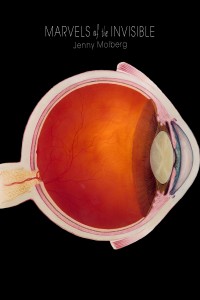Book Review
 Of the five senses, sight is probably the one that humans would name as the most important—trumping hearing, taste, smell, and touch—and they wouldn’t necessarily be wrong. But beyond sight lies a world full of riches, and this is the world that Jenny Molberg explores in her recent poetry collection, Marvels of the Invisible, the 2017 winner of Tupelo Press’s Berkshire Prize.
Of the five senses, sight is probably the one that humans would name as the most important—trumping hearing, taste, smell, and touch—and they wouldn’t necessarily be wrong. But beyond sight lies a world full of riches, and this is the world that Jenny Molberg explores in her recent poetry collection, Marvels of the Invisible, the 2017 winner of Tupelo Press’s Berkshire Prize.
The opening sequence “Echolocation” sets the tone for all of Marvels of the Invisible; each poem here speaks to what is felt, past what the eyes can see, buried deep within emotions and nature. Rather than using the obvious element—air—where bats use their sonar-like sense to locate prey, “Echolocation” engages water imagery—fins, sand, tides, shells—to reflect on the depths of the speaker’s grief. The loss of an unborn child emerges:
When they found your heartbeat
I thought, This could be a girl. Just as quick,
you were gone. The question, the what-if:
always regret. But that is too simple.
To regret is to be too late.
To regret is to refuse to swim further down.
The speaker moves beyond regret, and indeed, swims further down, into the “sunken body’s cave,” toward salvation. Which comes, however fitfully, however hard-won: “Now and again, you breach the heart’s surface: / this is your sounding; this is your wake.” The double meaning of “wake” in the final line reflects the speaker’s desire to put grief to rest, but also the knowledge that everything, ever after, will be altered by the shockwaves.
Composed of four sections, Marvels of the Invisible is a place in which science and God collide, but not in the way one might expect. The collision is not meant to be a battle. Instead, it is more of an uneasy reconciliation. “Necrosis” begins, “You, microscope, are a hungry priest.” “House of Making,” a haunting call-and-response poem, answers, “Yes, the sound of the body in prayer is made entirely of water.”
Molberg refuses to parse the usual polarities of religion and the natural world. She seeks to bring the two together, searching for the places and ideas that link them, as in “Pomegranate,” where she jumps from the “song of berries” to Israel and the Torah to Persephone pulling apart the fruit’s flesh all winter, feeding on death. These connections are often unexpected, informing a new vision of how ideas that are typically portrayed as disparate can and do coincide.
This palpable connection between physical and metaphysical guides Molberg’s poems—the natural world becomes its own place of worship, as in “After Twenty Junes”:
The earth dreams up the sky.
The moon is an opal, the stars
emeralds. I walk out. I look up.
The great mother looks back, flashes
her comet-tail smile. I am pregnant
with the spangled stone of time.
Motherhood teases the speakers of these poems, remaining just beyond grasp, just out of sight. The desire for children is stymied by something also just out of reach, just beyond the concreteness of understanding. The sequence “Matryoshka” opens, “When you take away the children / the mother is empty.” The poem “My Name in Sleep” says, “I will be a part of the wolves, / I will be part-wolf, the wolves continue in my dream; / I will be a horse, a woman, never / a mother, though you or I may dream it.” Lines like these build a mythos around motherhood; they also propel a story line rich with pain. For the speakers of Molberg’s poems, motherhood is not joyful abundance. It is, rather, a place of dashed hope and emptiness and anger. The pervasive grief of these poems is partly sadness at what cannot be realized, but it is also violence. The female body, as always, is a battleground—in Marvels of the Invisible, war is sometimes wrought by outer elements, but the truly destructive forces remain within.
Born of infertility, the palpable sense of loss that imbues Marvels of the Invisible is matched by a faith that transcends hope. Out of stillbirth rises the subtlety of reinvention and reincarnation, as in “Sound of the Spinning Wheel”:
I put my ears to the ground
until they are planted there
and I begin to hear the ground’s singing
the dead and their thousand
dying verses.
which concludes:
until I rise from my barrenness,
and tear myself in two.
Or perhaps it is the embrace of suffering as a means of maintaining memory, as in “Oyster”:
I know a shell can’t feel
but wonder anyway:
the absence of muscle, that spot, its belly,
like that spot in me you left.
. . .
It’s the place closest to pain that shines.
Perhaps, though, it is a welcoming of both reinvention and suffering that drives the poems in Marvels of the Invisible. Individually and as a whole, they carry emptiness to a place beyond darkness, and toward the cracks along the edges where light might force its way through. The collection seeks to connect eternal loss with the beauty of the natural world, and succeeds, mightily, in that regard. Heartfelt and lyric, Marvels of the Invisible also speaks to the wisdom of the body and the deep abyss of mourning. The poems reach toward what is just beyond grasp, and find much to be grateful for in the lean.
About the Reviewer
Sara Rauch’s debut story collection, What Shines from It, will be published in 2018. Her prose has appeared in Hobart, Split Lip, Gravel, So to Speak, Luna Luna , and more. She lives with her family in Massachusetts. sararauch.com / instagram.com/sara___rauch